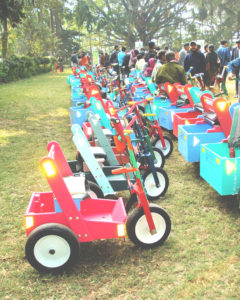
A Jack or a None
“Jack of All Trades.” I really like that title. But I don’t really like the second part, not often used but probably more relevant – “Master of None.” Ouch. I want to be a Jack but not a None. That may help to define my story a little bit. Always a Jack, striving to be a Master.
I was always interested in an overabundance of topics. Math, science, history, government, anthropology, religious studies. The list goes. This natural disposition, while a lot of fun for me personally, presented me with a problem when I was starting high school: What do I want to do with my life?
High School Pressure
At that point in my adolescence I felt a tension between the social side of things (history, government, anthropology, religious studies, etc.) and the harder sciences, usually referred to as the STEM fields (Science, Technology, Engineering, Mathematics). I had to make a choice. This choice was not an isolated decision. I was conscious that this choice in some way would affect my future career path, family, kids, where I lived, the list goes on. And everyone around me was making this decision either purposefully or not so purposefully.
That is a lot of pressure for a high school student. There are advisers, counselors, parents, friends that influence but in many ways it is a choice to be made by an individual. So what did I choose? Since I am an engineer here at Disher, it is somewhat obvious I chose the STEM path. But why?
Gifts and Challenges
The simple answer is fulfilling a need. I am a firm believer that we were all fashioned by a Creator who gives us work to do and the ability to do it – whether that is writing songs or building bridges. Our part in that work is preparing and gaining the skills needed to carry out this calling. Often, but not all the time, the careers that are fulfilling a pressing social, economic, cultural, and practical need are STEM related. These are the scientists creating new drugs, the engineers working on systems to irrigate crops, and the mathematicians who are using statistics to understand causes of poverty; these examples being among a myriad of other callings.
A study by Calvin College in 2008 titled, “Cultivating STEM” sheds a lot of light of the subject in the positive and the negative. In the affirmative, the researchers found that college students who chose a STEM field most often cited “natural gifts in the fields” and “the desire to improve the lives of others” as the major factors that influenced their choice. I think these are not the answers that most people would expect to hear! On the other hand, factors that discouraged the choice of a STEM major included “too challenging,” “uninteresting,” and “too many unsociable people.” I’ll bet most people expected that last one, much to every engineer’s chagrin. But they won’t admit that to you; at least not face to face.
Developmental Engineering
This desire to improve the lives of others as a top factor in influencing STEM majors has also been featured on an international stage. In October 2014 the Washington Post posted an article entitled, “Engineering Improvements for the World.” In it the authors further confirm the social and ethical motivations for many engineers and their endeavors. To quote at length,
In labs around the world, a new generation of engineers is emerging. They are men and women concerned by the gulf between rich and poor and by environmental changes and resource depletion. They are what we call “development engineers” — engineers (and often economics, business and social science majors, as well) who are dedicated to using engineering and technology to improve the lot of the world’s poorest people.
This noble cause and motivation for the STEM fields in many cases is not only charitable but purposeful and profitable. The authors cite the idea of boomerang innovations, those inventions that are created for the developing world but become a profitable venture for the developed world (one such example: a smartphone based ultrasound developed for the third world is now being used in first world hospitals around the globe). Examples like these are abundant and their frequency will likely grow. Perhaps the altruistic motivation for choosing a STEM field is slowly changing the way companies innovate and look at the world, and the people, around them.
Reckless
Here at Disher I have found a community of (sociable) people who are recklessly passionate about fulfilling needs and improving the lives of others. For us, engineering is the means to achieve those ends. This is illustrated by the smallest detail of our work, from the most mundane, to the most noble.
The engineers and support team here have worked on water filters for third world countries that can be built by hand, repaired in the field, and provided for a low cost. I have seen hand bikes designed for kids who can’t walk. Our team has worked on particle accelerators and piston rings, wind turbines and wheelchairs, car doors and car horns. All of this by a group of people who have chosen STEM fields as a career. Not for money, not for prestige, but for making a positive difference in the lives of others.




